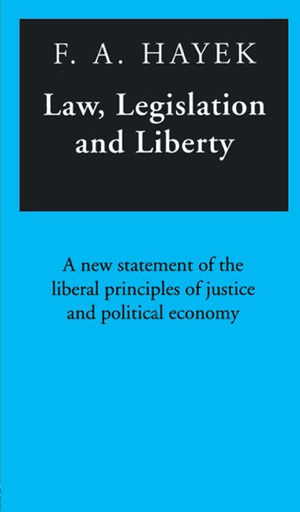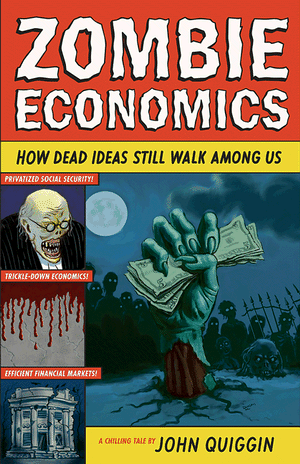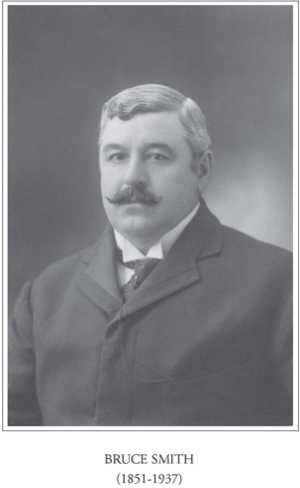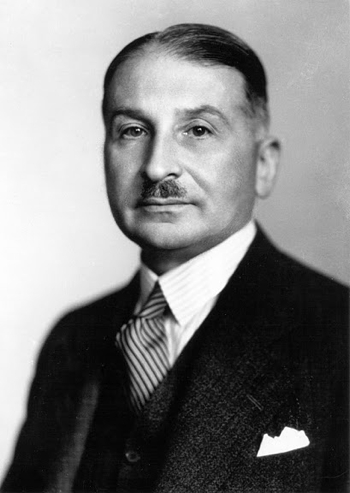
In the coming academic year I will be leading an online discussion on Hayek and Spontaneous Order which is part of a series of Discussion Colloquia for graduate students organised by the Institute for Humane Studies. In this discussion we will focus on the work of a leading classical liberal whose work has become “canonical” – in this case Friedrich Hayek (1899-1992) and read a selection of his works alongside a more recent book which is related in some important and deep way. The modern work which has been chosen is Finn Brunton, Digital Cash: The Unknown History of the Anarchists, Utopians, and Technologists Who Created Cryptocurrency (Princeton University Press, 2019).
The discussion topics and readings are:
1.) The Structure of Mind and Choice
- Reading: Hayek, Law, Legislation, and Liberty, Vol. I Rules and Order (London: Routledge and Kegan Paul, 1973). [See the analytical table of contents below]
2.) Action, Design, and Outcomes
- Hayek, “The Use of Knowledge in Society” (1945) which first appeared in The American Economic Review, 35 (4): 519–530. Republished in Individualism and Economic Order (Chicago: University of Chicago Press, 1948). Chapter 4, pp. 77–91; and most recently in The Market and Other Orders. Vol. XV of The Collected Works of F.A. Hayek. Edited by Bruce Caldwell (The University of Chicago Press, 2014), pp. 93-104.
- Hayek, “The Results of Human Action but not of Human Design” (1967) which first appeared in a Festschrift for Jacques Rueff Les Fondements Philosophiques des Systèmes Economiques (Paris, 1967) republished in Studies in Philosophy: Politics and Economics (London: Routledge and Kegan Paul, 1967), pp. 96-105; and most recently in The Market and Other Orders. Vol. XV of The Collected Works of F.A. Hayek. Edited by Bruce Caldwell (The University of Chicago Press, 2014), pp. 293-303.
- Hayek, “Principles of a Liberal Social Order” (1966) which was given as a paper at the Tokyo Meeting of the Mont Pélèrin Society (Sept. 1966) and then published in Il Politico (Dec. 1966) and again in Studies in Philosophy, Politics and Society (1967), pp. 160–77.
3.) The Planner’s Conceit
- Hayek, The Fatal Conceit: The Errors of Socialism. The Collected Works of F. A. Hayek. W. W. Bartley, III (ed.). (Chicago: University of Chicago Press, 1988).
4.) Hayek Today: Tech, Money, & Culture
- Finn Brunton, Digital Cash: The Unknown History of the Anarchists, Utopians, and Technologists Who Created Cryptocurrency (Princeton University Press, 2019).
Some additional modern attempts to apply Hayek’s insights about spontaneous orders in new areas, include:
- on the evolution of the family: Steven Horwitz, Hayek’s Modern Family: Classical Liberalism and the Evolution of Social Institutions (Palgrave Macmillan, 2015).
- on private governance such as stock markets: Edward P. Stringham, Private Governance: Creating Order in Economic and Social Life (Oxford University Press, 2015).
- on self-governance by groups like pirates: Peter T. Leeson, The Invisible Hook: The Hidden Economics Of Pirates (Princeton University Press, 2009); and more generally Anarchy Unbound: Why Self-governance Works Better than You Think (Cambridge: Cambridge University Press, 2014).
- on spontaneous social orders in prisons: David B. Skarbek, The Social Order of the Underworld: How Prison Gangs Govern the American Penal System (New York: Oxford University Press, 2014).
- on the spontaneous emergence of law itself: see the anthology of essays Research Handbook on Austrian Law and Economics. Edited by Todd J. Zywicki and Peter J. Boettke (Cheltenham, UK: Edward Elgar, 2017). And for the contrary argument that, as an “Ordo-liberal”, Hayek believed the legal and constitutional framework within which the spontaneous ordering of the market took place, was completely different from a market and thus had to be rationally “constructed” and “planned” by legislators, see Viktor Vanberg, “Hayek’s Legacy and the Future of Liberal Thought: Rational Liberalism versus Evolutionary Agnosticism” Cato Journal, Vol. 14, No. 2 (Fall 1994). Online.
Recommended Additional Reading
Introductions to and Overviews of Hayek’s life and work:
Peter Boettke, “Friedrich August von Hayek (1899–1992),” in Handbook on the History of Economic Analysis Volume I: Great Economists Since Petty and Boisguilbert, ed. Gilbert Faccarello and Heinz D. Kurz (Cheltenham: Edward Elgar Publishing, 2016), pp. 557–567.
David Schmidtz and Pedter Boettke, “Friedrich Hayek” Stanford Encyclopedia of Philosophy (2012) online at Friedrich Hayek (Stanford Encyclopedia of Philosophy).
Donald J. Boudreaux, The Essential Hayek (Fraser Institute, 2014). Essential Scholars (Fraser Institute) – Essential Scholars |
Steven Horwitz, Austrian Economics. An Introduction (Washington , DB.C.: Cato Institute, 2020). Online at Austrian Economics: An Introduction | Libertarianism.org.
Entries in the EoL (2008)
- Peter J. Boettke, Economics, Austrian School of: A Libertarianism.org Guide
- Ronald Hamowy, Hayek, Friedrich A. (1889-1992): A Libertarianism.org Guide
- Norman Barry, Spontaneous Order: A Libertarianism.org Guide
More Specialised Monographs
Peter Boettke has compiled (2018) a list of PhDs and journal articles on Hayek: A Living Bibliography of Works on Hayek | Mercatus Center: F. A. Hayek Program.
Peter Boettke, F. A. Hayek: Economics, Political Economy and Social Philosophy (New York: Palgrave Macmillan, 2018).
[Boettke, Coyne, and Storr] Interdisciplinary Studies of the Market Order. New Applications of Market Process Theory. Edited by Peter J. Boettke, Christopher J. Coyne, and Virgil Henry Storr (London: Rowman & Littlefield, 2017).
Bruce Caldwell, Hayek’s Challenge: An Intellectual Autobiography of F. A. Hayek (Chicago: University of Chicago Press. 2004).
[Coyne and Storr] New Thinking in Austrian Political Economy. Edited by Christopher J. Coyne and Virgil Henry Storr. Advances in Austrian Economics Volume 19. (Bingley U.K.: Emerald Publishing, 2015).
[Farrant, Andrew] Hayek, Mill and the Liberal Tradition. Edited by Andrew Farrant (London: Routledge Studies in the History of Economics, 2010).
[Feser] The Cambridge Companion to Hayek. Edited by Edward Feser (Cambridge University Press, 2006)
[McNamara and Hunt] Liberalism, Conservatism, and Hayek’s Idea of Spontaneous Order. Eds. P. McNamara and L. Hunt (New York: Palgrave Macmillan, 2007).
[Peart and Levy] F. A. Hayek and the Modern Economy. Economic Organization and Activity. Edited by Sandra J. Peart and David M. Levy (Palgrave Macmillan, 2013).
[Zywicki and Boettke] Research Handbook on Austrian Law and Economics. Edited by Todd J. Zywicki and Peter J. Boettke (Cheltenham, UK: Edward Elgar, 2017).
The Collected Works of Hayek
The Collected Works of Hayek ed. Bruce Caldwell (University of Chicago Press). Proposed volumes [The plan is provisional. See the current list The Plan of the Collected Works of F. A. Hayek — published and planned titles. ]
- University of Chicago Press – Book Series: The Collected Works of F. A. Hayek
- Volume I The Fatal Conceit: The Errors of Socialism (1988)
- Volume II The Road to Serfdom: Text and Documents—The Definitive Edition (2007)
- Volume III The Trend of Economic Thinking: Essays on Political Economists and Economic History (1991)
- Volume IV The Fortunes of Liberalism: Essays on Austrian Economics and the Ideal of Freedom (1992)
- Volume V Good Money, Part I: The New World (1999)
- Volume VI Good Money, Part II: The Standard (1999)
- Volume VII Business Cycles, Part I (2012)
- Volume VIII Business Cycles, Part II (2012)
- Volume IX Contra Keynes and Cambridge: Essays, Correspondence (1995)
- Volume X Socialism and War: Essays, Documents, Reviews (1997)
- Volume XI Capital and Interest (2015)
- Volume XII The Pure Theory of Capital (2007)
- Volume XIII Studies on the Abuse and Decline of Reason: Text and Documents (2010)
- Volume XIV The Sensory Order and Other Essays (2017)
- Volume XV The Market and Other Orders (2013)
- Volume XVI Hayek on Mill: The Mill- Taylor Friendship and Related Writings (2014)
- Volume XVII The Constitution of Liberty: The Definitive Edition (2011)
- Volume XVIII Essays on Liberty and Economics
- Volume XIX Law, Legislation and Liberty
- Supplement Hayek on Hayek: An Autobiographical Dialogue (1994)
The Analytical Table of Contents of the three volumes of Law, Legislation, and Liberty (1973-79)
All three volumes were published as a single volume with corrections and a revised preface in 1982 by Routledge & Kegan Paul. It also contained a combine Table of Contents, Index of Authors Cited, and Subject Index. The combined ToC is below:
Law, Legislation and Liberty: A new statement of the liberal principles of justice and political economy (London: Routledge & Kegan Paul, 1982, 1998).
Vol. 1 Rules and Order first published 1973
Vol. 2 The Mirage of Social Justice first published 1976
Vol. 3 The Political Order of a Free People first published 1979
First published in one volume with corrections and revised preface in 1982 by Routledge & Kegan Paul Ltd.
Volume 1. RULES AND ORDER
CONSOLIDATED PREFACE
INTRODUCTION xv
1 REASON AND EVOLUTION 8
1. Construction and evolution 8
2. The tenets of Cartesian rationalism 9
3. The permanent limitations of our factual knowledge 11
4. Factual knowledge and science 15
5. The concurrent evolution of mind and society: the role of rules 17
6. The false dichotomy of ‘natural’ and ‘artificial’ 20
7. The rise of the evolutionary approach 22
8. The persistence of constructivism in current thought 24
9. Our anthropomorphic language 26
10. Reason and abstraction 29
11. Why the extreme forms of constructivist rationalism regularly lead to a revolt against reason 31
2 COSMOS AND TAXIS 35
1. The concept of order 35
2. The two sources of order 36
3. The distinguishing properties of spontaneous orders 38
4. Spontaneous orders in nature 39
5. In society, reliance on spontaneous order both extends and limits our powers of control 41
6. Spontaneous orders result from their elements obeying certain rules of conduct 43
7. The spontaneous order of society is made up of individuals and organizations 46
8. The rules of spontaneous orders and the rules of organization 48
9. The terms ‘organism’ and ‘organization’ 52
3 PRINCIPLES AND EXPEDIENCY 55
1. Individual aims and collective benefits 55
2. Freedom can be preserved only by following principles and is destroyed by following expediency 56
3. The ‘necessities’ of policy are generally the consequences of earlier measures 59
4. The danger of attaching greater importance to the predictable rather than to the merely possible consequences of our actions 61
5. Spurious realism and the required courage to consider utopia 62
6. The role of the lawyer in political evolution 65
7. The modern development of law has been guided largely by false economics 67
4 THE CHANGING CONCEPT OF LAW 72
1. Law is older than legislation 72
2. The lessons of ethology and cultural anthropology 74
3. The process of articulation of practices 76
4. Factual and normative rules 78
5. Early law 81
6. The classical and the medieval tradition 82
7. The distinctive attributes of law arising from custom and precedent 85
8. Why grown law requires correction by legislation 88
9. The origin of legislative bodies 89
10. Allegiance and sovereignty 91
5 NOMOS: THE LAW OF LIBERTY 94
1. The functions of the judge 94
2. How the task of the judge differs fro In that of the head of an organization 97
3. The aim of jurisdiction is the maintenance of an ongoing order of actions 98
4. ‘Actions towards others’ and the protection of expectations 101
5. In a dynamic order of actions only some expectations can be protected 102
6. The maximal coincidence of expectations is achieved by the delimitation of protected domains 106
7. The general problem of the effects of values on facts 110
8. The ‘purpose’ of law 112
9. The articulations of the law and the predictability of judicial decisions 115
10. The function of the judge is confined to a spontaneous order 118
11. Conclusions 122
6 THESIS: THE LAW OF LEGISLATION 124
1. Legislation originates from the necessity of establishing rules of organization 124
2. Law and statute-the enforcement of law and the execution of commands 126
3. Legislation and the theory of the separation of powers 128
4. The governmental functions of mrepresentative assemblies 129
5. Private law and public law 131
6. Constitutional law 134
7. Financial legislation 136
8. Administrative law and the police power 137
9. The ‘measures’ of policy 139
10. The transformation of private law into public law by ’social’ legislation 141
11. The mental bias of a legislature preoccupied with government 143
NOTES 145
Volume 2. THE MIRAGE OF SOCIAL JUSTICE
7 GENERAL WELFARE AND PARTICULAR PURPOSES
1. In a free society the general good consists principally in the facilities for the pursuit of unknown purposes 1
2. The general interest and collective goods 6
3. Rules and ignorance 8
4. The significance of abstract rules in a world in which most of the particulars are unknown 11
5. Will and opinion, ends and values, commands and rules, and other terminological issues 12
6. Abstract rules operate as ultimate values because they serve unknown particular ends 15
7. The constructivist fallacy of utilitarianism 17
8. All valid criticism or improvement of rules of conduct must proceed within a given system of rules 24
9. ‘Generalization’ and the test of universalizabiiity 27
10. To perform their functions rules must be applied throughout the long run 29
8 THE QUEST FOR JUSTICE 31
1. Justice is an attribute of human conduct 31
2. Justice and the law 34
3. Rules of just conduct are generally prohibitions of unjust conduct 35
4. Not only the rules of just conduct, but also the test of their justice, are negative 38
5. The significance of the negative character of the test of injustice 42
6. The ideology of legal positivism 44
7. The ‘pure theory of law’ 48
8. Law and morals 56
9. The ‘law of nature’ 59
10. Law and sovereignty 61
9 ‘SOCIAL’ OR DISTRIBUTIVE JUSTICE 62
1. The concept of ‘social justice’ 62
2. The conquest of public imagination by ‘social justice’ 65
3. The inapplicability of the concept of justice to the results of a spontaneous process 67
4. The rationale of the economic game in which only the conduct of the players but not the result can be just 70
5. The alleged necessity of a belief in the justice of rewards 73
6. There is no ‘value to society’ 75
7. The meaning of ‘social’ 78
8. ‘Social justice’ and equality 80
9. ‘Equality of opportunity’ 84
10. ‘Social justice’ and freedom under the law 85
11. The spatial range of ‘social justice’ 88
12. Claims for compensation for distasteful jobs 91
13. The resentment of the loss of accustomed positions 93
14. Conclusions 96
APPENDIX TO CHAPTER 9 JUSTICE AND INDIVIDUAL RIGHTS 101
10 THE MARKET ORDER 0R CATALLAXY 107
1. The nature of the market order 107
2. A free society is a pluralistic society without a common hierarchy of ends 109
3. Though not a single economy, the Great Society is still held together by what vulgarly are called economic relations 112
4. The aim of policy in a society of free men cannot be a maximum of foreknown results but only an abstract order 114
5. The game of catallaxy 115
6. In judging the adaptations to changing circumstances comparisons of the new with the former position are irrelevant 120
7. Rules of just conduct protect only material domains and not market values 123
8. The correspondence of expectations is brought about by a disappointment of some expectations 124
9. Abstract rules of conduct can determine only chances and not particular results 126
10. Specific commands (‘interference’) in a catallaxy create disorder and can never be just 128
11. The aim of law should be to improve equally the chances of all 129
12. The Good Society is one in which the chances of anyone selected at random are likely to be as great as possible 132
11 THE DISCIPLINE OF ABSTRACT RULES AND THE EMOTIONS OF THE TRIBAL SOCIETY 133
1. The pursuit of unattainable goals may prevent the achievement of the possible 133
2. The causes of the revival of the organizational thinking of the tribe 134
3. The immoral consequences of morally inspired efforts 135
4. In the Great Society ‘social justice’ becomes a disruptive force 137
5. From the care of the most unfortunate to the protection of vested interests 139
6. Attempts to ‘correct’ the order of the market lead to its destruction 142
7. The revolt against the discipline of abstract rules 143
8. The morals of the open and of the closed society 144
9. The old conflict between loyalty and justice 147
10. The small group in the Open Society 149
11. The importance of voluntary associations 150
NOTES 153
Volume 3. THE POLITICAL ORDER OF A FREE PEOPLE
12 MAJORITY OPINION AND CONTEMPORARY DEMOCRACY
1. The progressive disillusionment about democracy
2. Unlimited power the fatal effect of the prevailing form of democracy 3
3. The true content of the democratic ideal 5
4. The weakness of an elective assembly with unlimited powers 8
5. Coalitions of organized interests and the apparatus of para-government 13
6. Agreement on general rules and on particular measures 17
13 THE DIVISION OF DEMOCRATIC POWERS 20
1. The loss of the original conception of the functions of a legislature 20
2. Existing representative institutions have been shaped by the needs of government, not of legislation 22
3. Bodies with powers of specific direction are unsuited for law-making 25
4. The character of existing ‘legislatures’ determined by their governmental tasks 27
5. Party legislation leads to the decay of democratic society 31
6. The constructivistic superstition of sovereignty 33
7. The requisite division of the powers of representative assemblies 35
8. Democracy or demarchy? 38
14 THE PUBLIC SECTOR AND THE PRIVATE SECTOR 41
1. The double task of government 41
2. Collective goods 43
3. The delimitation of the public sector 46
4. The independent sector 49
5. Taxation and the size of the public sector 51
6. Security 54
7. Government monopoly of services 56
8. Information and education 60
9. Other critical issues 62
15 GOVERNMENT POLICY AND THE MARKET 65
1. The advantages of competition do not depend on it being ‘perfect’ 65
2. Competition as a discovery procedure 67
3. If the factual requirements of ‘perfect’ competition are absent, it is not possible to make firms act ‘as if’ it existed 70
4. The achievements of the free market 74
5. Competition and rationality 75
6. Size, concentration and power 77
7. The political aspects of economic power 80
8. When monopoly becomes harmful 83
9. The problem of anti-monopoly legislation 85
10. Not individual, but group selfishness is the chief threat 89
11. The consequences of a political determination of the incomes of the different groups 93
12. Organizable and non-organizable interests 96
16 THE MISCARRIAGE OF THE DEMOCRATIC IDEAL: A RECAPITUALATION 98
1. The miscarriage of the democratic ideal 98
2. A ‘bargaining’ democracy 99
3. The playball of group interests 99
4. Laws versus directions 100
5. Laws and arbitrary government 101
6. From unequal treatment to arbitrariness 102
7. Separation of powers to prevent unlimited government 104
17 A MODEL CONSTITUTION 105
1. The wrong turn taken by the development of representative institutions 105
2. The value of a model of an ideal constitution 107
3. The basic principles 109
4. The two representative bodies with distinctive functions 111
5. Further observations on representation by age groups 117
6. The governmental assembly 119
7. The constitutional court 120
8. The general structure of authority 122
9. Emergency powers 124
10. The division of financial powers 126
18 THE CONTAINMENT OF POWER AND THE DETHRONEMENT OF POLITICS 128
1. Limited and unlimited power 128
2. Peace, freedom and justice: the three great negatives 130
3. Centralization and decentralization 132
4. The rule of the majority versus the rule of laws approved by the majority 133
5. Moral confusion and the decay of language 135
6. Democratic procedure and egalitarian objectives 137
7. ‘State’ and ‘society’ 139
8. A game according to rules can never know justice of treatment 141
9. The para-government of organized interests and the hypertrophy of government 143
10. Unlimited democracy and centralization 145
11. The devolution of internal policy to local government 146
12. The abolition of the government monopoly of services 147
13. The dethronement of politics 149
EPILOGUE: THE THREE SOURCES OF HUMAN
VALUES 153
1. The errors of sociobiology 153
2. The process of cultural evolution 155
3. The evolution of self-maintaining complex systems 158
4. The stratification of rules of conduct 159
5. Customary rules and economic order 161
6. The discipline of freedom 163
7. The re-emergence of suppressed primordial instincts 165
8. Evolution, tradition and progress 168
9. The construction of new morals to serve old instincts: Marx 169
10. The destruction of indispensable values by scientific error: Freud 173
11. The tables turned 175
NOTES 177
INDEX 0F AUTHORS CITED IN VOLUMES 1 – 3 209
SUBJECT INDEX TO VOLUMES 1-3 217



















